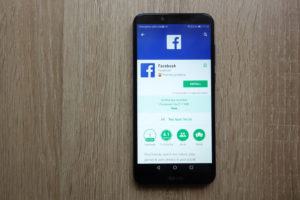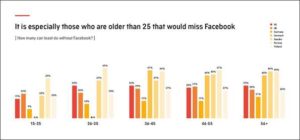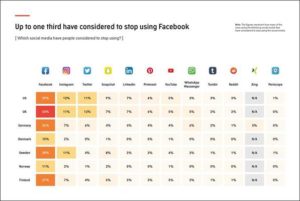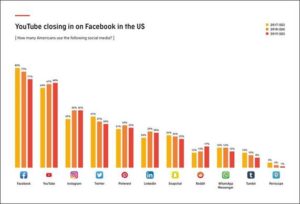
The importance of Facebook as a mobile app in the eyes of consumers across the US, UK, Germany and Northern Europe is in steep decline a major study of 13,000 people by technology-based market research company AudienceProject has found.
The study set out to ask consumers in seven markets how indispensable different apps on their mobile phones were in their daily lives and revealed a major attitudinal change towards Facebook in favour of instant messaging and other social content sharing and non-social apps in all markets.
Facebook increasingly dispensable

AudienceProject’s investigation of people’s attitudes to apps and social media usage across the US, UK, Germany, Denmark, Sweden, Norway and Finland, suggests Facebook’s reputation as a must-use platform has declined significantly and may continue to do so in the coming months.
In Q2 2017, Facebook was considered the most indispensable app in the US by more than a quarter of respondents (26%), but this had declined by Q3 2019 to 21%. The UK saw a greater percentage drop over the same period from 32% in Q2 2017 to 23% in Q3 2019. The decline in popularity was also seen across Northern Europe over the same period: Denmark (30 to 24%), Sweden (22 to 13%), Norway (32 to 21%) and Finland (30 to 23%).
In the US, Instagram was the fourth most indispensable app in Q2 2017, but by Q3 2019 it had risen to second place. There was a similar rise in Instagram usage across the UK (32 to 45%) and Northern Europe: Denmark (29 to 40%), Sweden (52 to 57%), Norway (49 to 57%) and Finland (35 to 46%). WhatsApp Messenger is considered the most indispensable app in the UK, Germany and Finland (27%, 18% and 53% respectively).
Ageing social media

This trend was found to be more pronounced amongst young people. In the UK, just 16% of those aged 15-25 view Facebook as the most indispensable app, putting it fifth behind other social media apps including WhatsApp Messenger (27%), Messenger (22%), Instagram (20%) and Snapchat (16%).
In the US, 18% of 15-25-year-olds, put Facebook ahead with Instagram first choice for 26%, YouTube second choice for 20% and Snapchat third choice for 20% as well. And the same pattern was seen in Germany with Facebook chosen by 6% behind WhatsApp Messenger (14%) and Instagram (8%).
Social gender bias

The study also suggests Facebook has a distinctly female bias. In the US, 17% of men named Facebook as their indispensable app compared to 26% of women. In the UK, more than a quarter (27%) of UK women consider Facebook to be the most indispensable app, while 20% of UK men agreed. In Germany, the balance was more equal but in Finland, while 30% of women rated Facebook as indispensable only 15% of men agreed.
In the context of the Cambridge Analytica personal data usage scandal, AudienceProject found up to one-third of Facebook users have considered stopping using the social media platform altogether (29% in the US, 34% in the UK, 25% in Germany, 28% in Sweden and 27% in Finland).
In some markets, the regard for Facebook amongst younger people fell more sharply; 37% of 15-25-year-olds in the UK considered deleting the Facebook app, 38% in Germany, 31% in Sweden and 29% in Finland.
Social society

Although Facebook is still the most used social media app in most markets studied by AudienceProject (with the notable exception of Germany and Finland), usage has declined as people’s perception of the importance of Facebook has changed.
In the UK, use of Facebook increased over the period studied by 1% from 76% of consumers to 77%, but the use of WhatsApp Messenger increased more, from 48% of consumers in Q2 2017 to 67% in Q3 2019.
AudienceProject found social media is still by far the dominant category of apps in terms of usage, with people spending over half of their time on social media apps.
This is exemplified in the study by the fact that almost half (43%) consider social media to be important or very important to them and only a minority (14%) believe it has a negative impact on their lives. In fact, on average, five out of the top 10 most indispensable apps in each market are social media.
Beyond social media

The study revealed that people have on average of 20 apps installed on their mobiles (excluding pre-installed apps). The top three types of apps people spend most of their time on were the same across all markets and were identified as social media / chat apps, mail apps and browser apps.
However, BBC News featured in the top 10 apps people in the UK can least do without highlighting a desire for “real news” and similarly each of the Nordic countries featured at least one local news app in the top 20. Banking / financial apps also featured in the top 10 most indispensable apps across Denmark, Sweden, Norway and Finland.
Rune Werliin, Chief Product Officer at AudienceProject commented on the research findings: “Social media continues to dominate app usage across all markets; however, we are seeing a shift in the type of social media that is capturing user attention. Whilst still indispensable to many, Facebook’s importance has declined significantly across every market. Instead, we’re now seeing instant messaging and visual content sharing apps taking centre stage. This underlines the clever investments Facebook made in WhatsApp Messenger and Instagram. The diversity of app and social media usage creates an obstacle for many brands and agencies trying to reach their target audiences as well as to measure the effect. Therefore, it’s important for brands, publishers and agencies alike to have deep insight into the ever-changing and evolving patterns of consumer app and social media usage and behaviour, ultimately to better their engagement and boost campaign performance.”
Source: AudienceProject

You must be logged in to post a comment Login